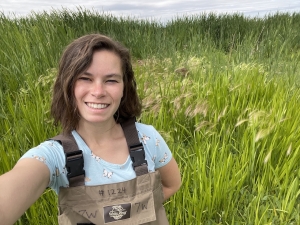2023 Doyle W. Stephens Scholarship Winner
Brigham Young University
Bio:
I am a master’s student in the biology department at Brigham Young University. My research focuses on the impact of mitigation treatments of the invasive reed Phragmites australis ssp. australis on wetland soil nutrient cycling and the microbial community. Our Great Salt Lake performs essential ecological functions for humans and wildlife, many of which are being compromised by the rapid invasion of this European variant of Phragmites. Due to anthropogenic pressures such as nutrient loading, removing the invasive plant may cause more stress in some wetland areas, further damaging ecosystem function. I received a bachelor’s degree in biology from BYU, where I was lucky to work with soils as well as perform research into damselfly phylogeny. After graduation I spent some time working in forensic DNA labs for police departments, and now I’m excited to be continuing my schooling with research that may help protect our Great Salt Lake. I plan to continue on to a PhD and become a research scientist, helping to discover more about our planet and how to preserve it. I am passionate about biology and research and am thrilled to be setting an example of the importance of education for my young toddler.
Title: Assessing the Effects of Invasive Species Mitigation on Utah’s Wetland Microbial Systems
Abstract: My research is focused on the effects of invasive Phragmites australis ssp. australis removal on soil microbial and nutrient dynamics. My lab sampled 75 wetland sites in the summer of 2022, including sites dominated by native wetland vegetation, sites dominated by invasive Phragmites, and sites that had recently received any treatment to remove Phragmites. Soil DNA/RNA extraction and analysis is ongoing, and we are excited to soon use targeted gene abundance to assess microbial composition and activity at our sample sites. Apart from the anticipated genetic data, we have completed the physiochemical testing of the soil and water samples taken in 2022 and have found that Phragmites abundance appears to have little effect on the pools nitrogen and phosphorus in the soil. We have also seen that the different types of mitigation treatment (eg. herbicides, trampling, grazing, etc.) are associated with differences in resulting plant community composition, with potential effects on nutrient dynamics in treated wetlands.

